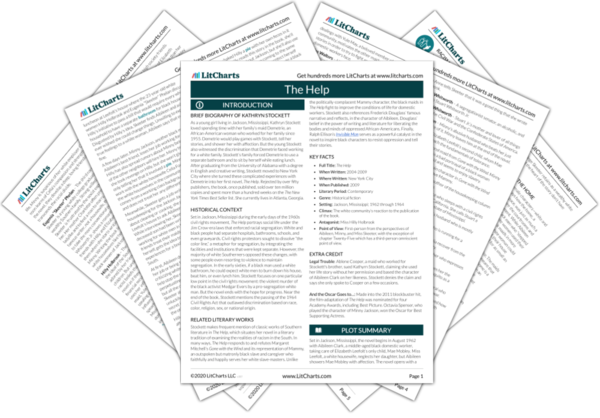The Help offers an in-depth meditation on the complicated effects that class has on people’s social interactions, specifically with regards to race. The Help portrays class as providing the basis for Jackson’s tiered white society: the wealthy and “well-bred” are at the top, setting the social conventions and attitudes for everyone else below. Elizabeth Leefolt and Celia Foote exemplify opposing ways of how a white Southern woman can navigate social class. Elizabeth comes from a “good” family, but her lack of monetary inheritance and her husband’s low income mean that she cannot fully integrate into wealthy high society. As a result, Elizabeth conceals her family’s lack of wealth with symbols of class, specifically by hiring a maid she can barely afford to pay. A maid confers class status to the average white 1960s Southern woman, since having a maid distances the housewife from the physical labor required to run a household, especially as physical labor is associated with black people and the lower class. However, this desire to increase her class status makes her less racially sensitive. For example, in order to appear wealthy and follow the conventions of her racist society, Elizabeth gives in to Miss Hilly’s suggestion that she build a separate bathroom for “the help.”
Celia Foote’s social standing is the exact opposite of Elizabeth’s. Since Celia comes from a poor, “white trash” family but marries into a wealthy one, she lacks knowledge of the largely unspoken rules of middle-class white conduct. Thus she treats Minny, her maid, with more respect, since Celia is unaware of how white women are “supposed” to treat black people as inferior—even though this seems culturally inaccurate, since racism is not limited to the upper class or correlated to wealth at all. In the world of the novel, however, Celia’s low class means she holds less racist attitudes. Even so, the allure of acceptance into high Southern society tempts Celia, and she risks letting her upper-class peers’ racist influence shape her attitudes. By the end of the novel, however, her inability to assimilate into high society turns her once and for all against the discriminatory attitudes of the wealthier-born white women. Rejected by her wealthy neighbors, Celia has a sense of what it means to be unfairly discriminated against. While she is still generally blind to her own privilege, this experience does give her the empathetic sensitivity to treat Minny, a fellow outcast, with respect and human kindness.
Social Class ThemeTracker

Social Class Quotes in The Help
See, I think if God had intended for white people and colored people to be this close together for so much of the day, he would’ve made us color-blind. And while Miss Celia’s grinning and “good morning” and “glad to see”-ing me, I’m wondering, how did she get this far in life without knowing where the lines are drawn? I mean, a floozy calling the society ladies is bad enough. But she has sat down and eaten lunch with me every single day since I started working here. I don’t mean in the same room, I mean at the same table. That little one up under the window. Every white woman I’ve ever worked for ate in the dining room as far away from the colored help as they could. And that was fine with me…There are so many things Miss Celia is just plain ignorant about.

Unlock explanations and citation info for this and every other The Help quote.
Plus so much more...
Get LitCharts A+She’s got no goo on her face, her hair’s not sprayed, her nightgown’s like an old prairie dress. She takes a deep breath through her nose and I see it. I see the white trash girl she was ten years ago. She was strong. She didn’t take no shit from nobody.











